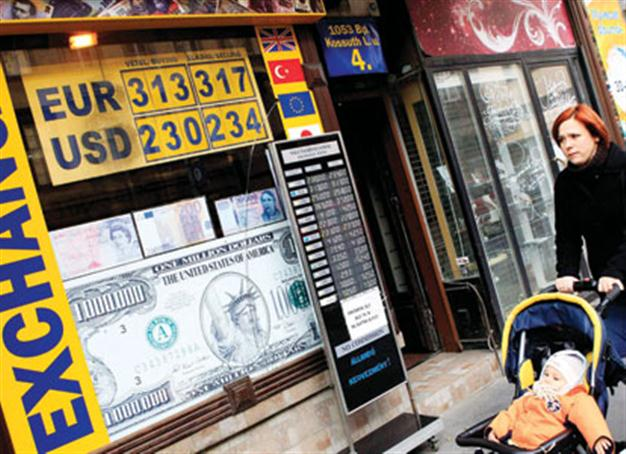
A woman pushes her baby in a stroller past a board displaying exchange rates in Budapest on Nov 15. The eurozone crisis underlies Hungary’s financial woes. REUTERS photo
Hungary has asked the International Monetary Fund and the European Union for financial assistance, the IMF chief announced yesterday.
“The IMF has received a request from the Hungarian authorities for possible financial assistance,” IMF managing director Christine Lagarde said in a statement.
“The authorities have sent a similar request to the European Commission [EC]and indicated that they plan to treat as precautionary any IMF and EC support that could be made available,” the statement added.
Lagarde said an IMF team currently working in Budapest will now return to Washington for consultations with the IMF management and board.
Hungary has suffered from the eurozone debt crisis as well as the economic policies pursued by Prime Minister Viktor Orban’s centre-right government, which has made investors wary, analysts say.
Official figures recently showed that Hungary’s total debt had risen to 82 percent of Gross Domestic Product by September from 75 percent at the end of June, which the authorities blamed on a weakening forint.
Since coming to power in April 2010, the government has levied huge taxes on various sectors to fill budget holes caused by falling domestic consumption and an income tax cut, and effectively nationalised 11 billion euros in assets held by private pension funds.
It also introduced a contested scheme to allow those people who had taken out foreign currency loans to repay their mortgage loans at below-market exchange rates, forcing the lenders to take the resulting losses.
Analysts predict Hungary will have the lowest growth among the 10 European Union newcomers who joined the bloc in 2004, expanding just 0.5 percent in 2012. Some have even predicted a recession.
Credit rating agencies Standard and Poor’s and Fitch have warned that Hungary’s outlook is clouded in light of government policies and strains on its economy.
Hungary is rated one notch above non-investment grade and a cut to junk status would make the financing of its sovereign debt even more expensive and difficult.
The country has already experienced difficulty finding investors willing to buy its debt, with several bond auctions cancelled in recent weeks.